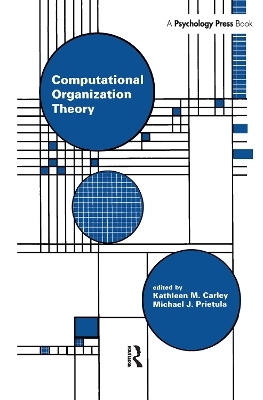
Computational Organization Theory
Psychology Press Ltd (Verlag)
978-1-138-97140-0 (ISBN)
Authored by leading researchers in the area of computational organization theory, the various chapters demonstrate the value of computational analysis for organizational theory and advance our understanding of the relationship between organizational design and performance. This book contains both theoretical and methodological contributions that enable organizational theorists to use computational and mathematical techniques to systematically address the complex relationships that underlie organizational life. It also presents new -- or sometimes, renewed -- approaches on how to conduct organizational research from multiple formal perspectives including: simulation, numerical analysis, symbolic logic, mathematical modeling, and graph theory.
Kathleen M. Carley, Michael J. Prietula
Contents: R.M. Cyert, Foreword. K.M. Carley, M.J. Prietula, Introduction: Computational Organization Theory. R.E. Levitt, G.P. Cohen, J.C. Kunz, C.I. Nass, T. Christiansen, Y. Jin, The "Virtual Design Team": Simulating How Organization Structure and Information Processing Tools Affect Team Performance. K. Crowston, Evolving Novel Organizational Forms. H. Verhagen, M. Masuch, TASCCS: A Synthesis of Double-AISS and Plural-Soar. K.M. Carley, M.J. Prietula, ACTS Theory: Extending the Model of Bounded Rationality. D. Krackhardt, Graph Theoretical Dimensions of Informal Organizations. Z. Lin, A Theoretical Evaluation of Measures of Organizational Design: Interrelationship and Performance Predictability. M. Verkama, R.P. Hämäläinen, H. Ehtamo, Modeling and Computational Analysis of Reactive Behavior in Organizations. H.H. Baligh, R.M. Burton, B. Obel, Validating an Expert System That Designs Organizations. T.K. Lant, Computer Simulations of Organizations as Experiential Learning Systems: Implications for Organization Theory. N.S. Glance, B.A. Huberman, Social Dilemmas and Fluid Organizations. D.K. Gode, S. Sunder, Human and Artificially Intelligent Traders in Computer Double Auctions. P. Shi, P.B. Luh, D.L. Kleinman, Team Coordination Under Individual and Team Goals. G.E.G. Beroggi, W.A. Wallace, A Decision Logic for Operational Risk Management.
| Erscheinungsdatum | 24.07.2016 |
|---|---|
| Verlagsort | Hove |
| Sprache | englisch |
| Maße | 152 x 229 mm |
| Gewicht | 453 g |
| Themenwelt | Geisteswissenschaften ► Psychologie ► Allgemeine Psychologie |
| Geisteswissenschaften ► Psychologie ► Arbeits- und Organisationspsychologie | |
| Geisteswissenschaften ► Psychologie ► Verhaltenstherapie | |
| Wirtschaft ► Betriebswirtschaft / Management ► Planung / Organisation | |
| ISBN-10 | 1-138-97140-5 / 1138971405 |
| ISBN-13 | 978-1-138-97140-0 / 9781138971400 |
| Zustand | Neuware |
| Informationen gemäß Produktsicherheitsverordnung (GPSR) | |
| Haben Sie eine Frage zum Produkt? |
aus dem Bereich


